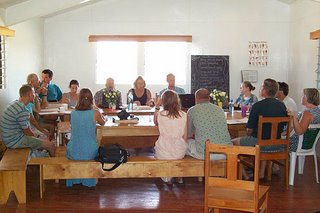Meetings

Librarians are highly communicative people and are constantly going to meetings. There are the national organizational meetings, the state meetings, and there are the county or regional network meetings. These meetings allow the staff to get out of the library, have a nice lunch, network for new jobs and gossip with other librarians. They also allow for a new source of complaints when one gets back and notices how much better off the people in other libraries are.
In-house meetings can be task oriented, departmental or staff wide. In the task oriented meetings a lot can be accomplished if the leader keeps the topic at hand. People attending these meetings should remember that it is not always necessary to inform everyone at the table of your knowledge on every topic.
Departmental meetings are often whining sessions with the agreed cause of most problems being the inflexible policies of the other departments.
The staff-wide meetings provide the best theatre because practically everybody attends them. I have noted, however, that the issues raised there are usually the primary concern of someone who is not in attendance. A staffer is rude to a patron. The staff is lectured on library courtesy. The staffer in question is off because he/she is working on Saturday. A staffer calls in sick five days in a month. The staff is lectured on the importance of attendance. The staffer in question calls in sick. I also have a theory that the person with the least amount of relevant information on a topic is the person who will usually have the most to say at meetings.
Critical meetings between the director and senior staff are the most important ones, since this is where many decisions are usually made. To allow for full attendance at such meetings, at least one person in the group will be donating unpaid overtime.

0 Comments:
Post a Comment
<< Home